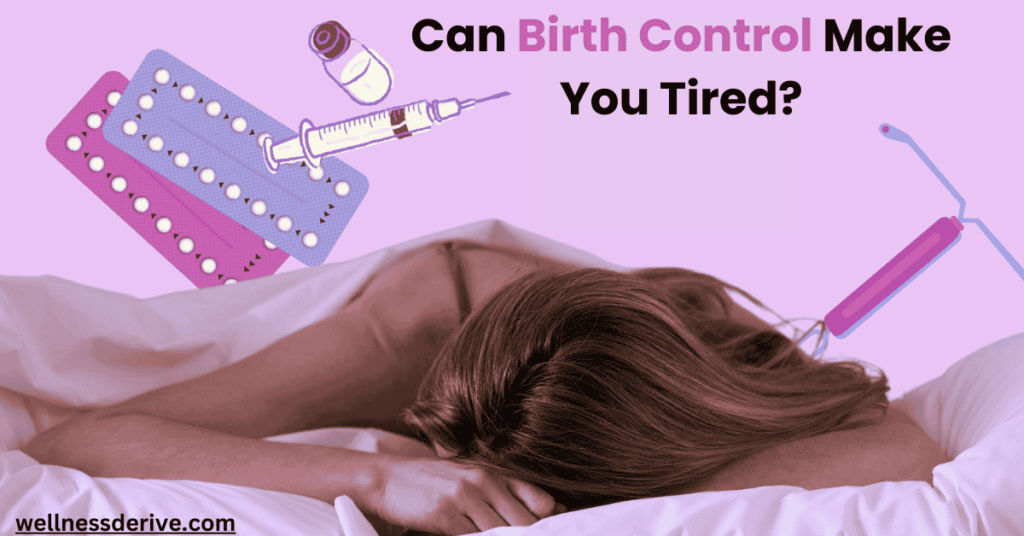Fatigue is a common complaint among those starting or using hormonal birth control. Many wonder, “Can birth control make you tired?” While birth control is an effective and widely used contraceptive, it can sometimes lead to side effects, including fatigue and drowsiness. This article explores the link between birth control and tiredness, why it happens, and practical ways to manage these symptoms.
How Birth Control Works
Hormonal birth control, such as pills, patches, IUDs, or implants, regulates hormones like estrogen and progestin to prevent pregnancy. These hormones affect ovulation, the uterine lining, and cervical mucus, creating an environment where pregnancy is unlikely.
However, these hormonal changes can also impact energy levels, leading to symptoms like fatigue or drowsiness.
Can Birth Control Make You Tired?
Yes, birth control can make you tired. Fatigue is a reported side effect of many hormonal contraceptives, especially when starting a new method. Here’s why:
1. Hormonal Fluctuations
Hormonal changes are the primary reason for birth control-related fatigue.
- Progestin Effects: Progestin, found in many birth control methods, can have a sedative-like effect, making you feel more tired or sleepy.
- Estrogen Levels: Low estrogen levels can lead to decreased energy and feelings of tiredness.
2. Adjusting to New Hormones
Starting a new birth control method can temporarily disrupt your body’s hormonal balance. Fatigue is common during this adjustment period, which can last a few weeks.
3. Impact on Sleep Patterns
Birth control may affect sleep by influencing melatonin production, leading to drowsiness or poor-quality sleep.
4. Other Side Effects Contributing to Fatigue
- Mood Changes: Hormonal shifts can cause mood swings or feelings of depression, indirectly causing fatigue.
- Iron Deficiency: Some contraceptives reduce menstrual bleeding, potentially leading to lower iron levels, which can affect energy.
Common Birth Control Methods and Their Impact on Fatigue
Different contraceptives may affect energy levels in varying ways:
Birth Control Pills
- Many users report tiredness, especially with progesterone-only pills.
- Symptoms like fatigue tend to diminish after the first few weeks of use.
IUDs (Intrauterine Devices)
- Hormonal IUDs like Mirena or Kyleena can cause drowsiness in some individuals due to progestin.
- Copper IUDs, which are non-hormonal, generally do not impact energy levels.
NuvaRing
The NuvaRing releases a combination of estrogen and progestin, which may cause tiredness in some users, especially during the initial adjustment period.
Progesterone-Only Contraceptives
Depo-Provera shots or progesterone-based pills may cause more pronounced fatigue due to the sedative effects of progestin.
Does Birth Control Make You Sleepy?
Yes, in some cases, birth control can make you feel sleepy. This is primarily related to the hormone progestin, which can mimic the body’s natural calming hormones and make you feel more drowsy throughout the day.
Why Am I So Tired on Birth Control?
If you’re experiencing significant fatigue while using birth control, several factors could be at play:
- Hormone Sensitivity: Some individuals are more sensitive to hormonal changes, making them more prone to fatigue.
- Underlying Health Conditions: Pre-existing conditions like anemia, thyroid issues, or sleep disorders can exacerbate birth control-related tiredness.
- Lifestyle Factors: Poor sleep, stress, and diet can amplify feelings of fatigue when combined with hormonal contraceptives.
Can Birth Control Cause Extreme Fatigue?
While extreme fatigue is less common, it can occur in certain cases, such as:
- Allergic Reactions to Hormones: Sensitivity to synthetic hormones in birth control.
- Underlying Conditions: Birth control can interact with conditions like chronic fatigue syndrome or depression.
- High Levels of Progestin: Contraceptives with high doses of progestin are more likely to cause pronounced fatigue.
How to Combat Fatigue from Birth Control
If birth control is making you tired, there are several ways to manage and reduce this side effect:
1. Wait for Adjustment
Fatigue often resolves within the first few weeks to months as your body adjusts to the new hormones.
2. Choose the Right Birth Control
If one method causes fatigue, consult your healthcare provider about alternatives. For example:
- Switch from a progestin-only pill to a combination pill.
- Opt for non-hormonal methods like a copper IUD.
3. Maintain a Healthy Lifestyle
- Diet: Include iron-rich foods like spinach, lean meats, and beans to prevent fatigue.
- Exercise: Regular physical activity boosts energy levels.
- Hydration: Drink enough water to stay energized.
4. Improve Sleep Hygiene
- Stick to a consistent sleep schedule.
- Create a relaxing bedtime routine to improve sleep quality.
5. Address Underlying Conditions
Fatigue may indicate other health issues. Check for conditions like anemia, thyroid disorders, or vitamin deficiencies.
When to Talk to a Doctor
While mild fatigue is common, extreme or persistent tiredness should not be ignored. Speak to your doctor if you experience:
- Severe fatigue lasting more than a few weeks.
- Fatigue accompanied by mood changes, headaches, or other severe side effects.
- Sleep disturbances or difficulty staying awake during the day.
Frequently Asked Questions (FAQs)
1. Does Birth Control Make You Sleepy When You First Start?
Yes, it’s common to feel sleepy during the first few weeks of starting birth control as your body adjusts to the hormones.
2. Can Birth Control Cause Extreme Fatigue?
In some cases, hormonal contraceptives can cause extreme fatigue, especially if you’re sensitive to progestin.
3. How Long Does Fatigue Last After Stopping Birth Control?
Fatigue typically resolves within a few weeks after stopping birth control as hormone levels stabilize.
4. Does Progesterone Cause Tiredness?
Focus on maintaining a healthy diet, staying active, and consulting your doctor to find the best contraceptive method for you.
5. How Can I Reduce Fatigue While on Birth Control?
Focus on maintaining a healthy diet, staying active, and consulting your doctor to find the best contraceptive method for you.
Conclusion
Fatigue can be a frustrating side effect of birth control, especially during the adjustment phase. Hormonal changes, particularly those caused by progestin, can contribute to tiredness, drowsiness, and low energy levels. However, for most people, these symptoms subside over time as the body adapts to the new hormonal balance.
If fatigue persists or becomes severe, it’s important to consult your healthcare provider to explore alternative contraceptive methods or address potential underlying conditions. By maintaining a healthy lifestyle and monitoring your body’s response, you can find a birth control method that works best for your needs while minimizing unwanted side effects.
Disclaimer: The content on Wellness Derive is for informational purposes only and not a substitute for professional medical advice, diagnosis, or treatment. Always consult a healthcare provider for medical concerns.



